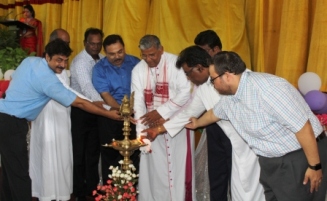Called to follow Christ through Baptism, the call to be a teacher is a call within a call: for those who are Christian teachers, the question is, “Do we understand that ours is not a mere profession, but a call to spread the light of knowledge and values, so that we can be instruments of love and peace to the children and adolescents in our care?”
For the first time in a hundred years, some six hundred Catholic teachers from about 42 schools and institutions of higher learning within Patna gathered at Loyola High School, Kurji in a spirit of communion and fellowship. Called together by Archbishop William D’Souza SJ in an event that marked a hundred years of the Archdiocese in the service of Bihar and its people.

The first two ‘modern’ educational institutions in undivided Bihar, started in the late 1800s. They were St. Joseph’s School for girls in 1853 and St. Michael’s School for boys in 1858. These two institutions had boarding facilities and imparted education not only to the Anglo-Indians, but to children from prominent families of Bihar, Bengal, and Nepal. Children from ordinary families rubbed shoulders with princes and local aristocracy. These schools were already forming the citizens of a ‘new India’ long before government schools came into being.
According to Fr Jose Kalapura, researcher and church historian, “The Church’s most significant contribution to Bihar has been through education. Today the Catholic Church in Bihar is serving the people through its 222 educational institutions (from primary to senior secondary schools) and six colleges (including three community colleges). These are managed by the dioceses, or by religious congregations. Besides these some 75 private schools are run by the Catholic laity. Together they educate some 3,00,000 students. To facilitate the education of the rural poor, hundreds of hostels for boys and girls were opened by the Church over the years.”
If the oft repeated traditional mantra is ‘Lead us from darkness to light,’ the almost ten foot wide backdrop on the stage urged teachers to continue let their light shine so that several thousands of youngsters could be enlightened.

‘Catholic teachers and clerical staff are the backbone of the Catholic schools, and the centenary year was an apt occasion to bring them together and honour them,’ says Fr. Joseph Raj, director of the Archdiocesan Educational Council.
‘It was a greatly energizing experience, to see, for the first time just how many of us are there as Catholic Teachers. From this event should grow a follow-up, maybe we could have a once year gathering like this to come together to pray , have fellowship, and discuss some relevant issues,’ said Alan Cowell from Don Bosco Academy.
Most Reverend William D’Souza SJ officiated at a resounding Eucharistic Celebration, made especially joyous by the Loyola teachers’ choir, with a liturgy that was a thanksgiving and an offering to the Lord, a pledge of continued service to His children of all ages, castes, and creeds.
The next session was a motivational talk given by Fr Michael, the director of Navjyoti Niketan, Archdiocesan training and conference centre. This was followed by some sharing from the senior-most Catholic teachers from Christian institutions. Later on, Archbishop D’Souza presented momentos to the senior-most staffers either clerical or teaching staff from the 42 institutions as a token of appreciation for their hard work.
The Principal and Staff and students of Loyola school (run by the Montfort Brothers of St. Gabriel) graciously took care of all the participants and organised a lavish lunch in their honour.
One should also spare a thought of the two Catholic women teachers , as the entire community knows, were victimized by a patently false accusation under POCSO, harassed and put into jail for months on end. The bitter truth is that their accuser is a woman in league with powerful vested interests. The incident showed how helpless school administrations of even our best schools are in the face of a new kind of attack: false witness by vested interests to undermine the moral standing of our institutions coupled with trial by media that hungers for cheap sensationalism.
A teacher who would like to remain anonymous praised a great and worthy gesture of the Archbishop and the diocese for honouring the teachers. She also suggested that school administrations, especially those run by Lay Catholics should back up the teachers who they take a moral stand, and not themselves bow down to powerful vested interests.
The celebration, should also become the starting point for a more sober visioning of what lies ahead for minority Catholic Educational Institutions. What are the roles that schools must play given the emerging socio-political scenario? What are expected of teachers and supervisors in Catholic run institutions? The Diocesan Education Council has showed its skill in bringing together some 600 plus teachers for an event, it should now channel this energy in a positive direction. Let’s not wait another 100 years!

